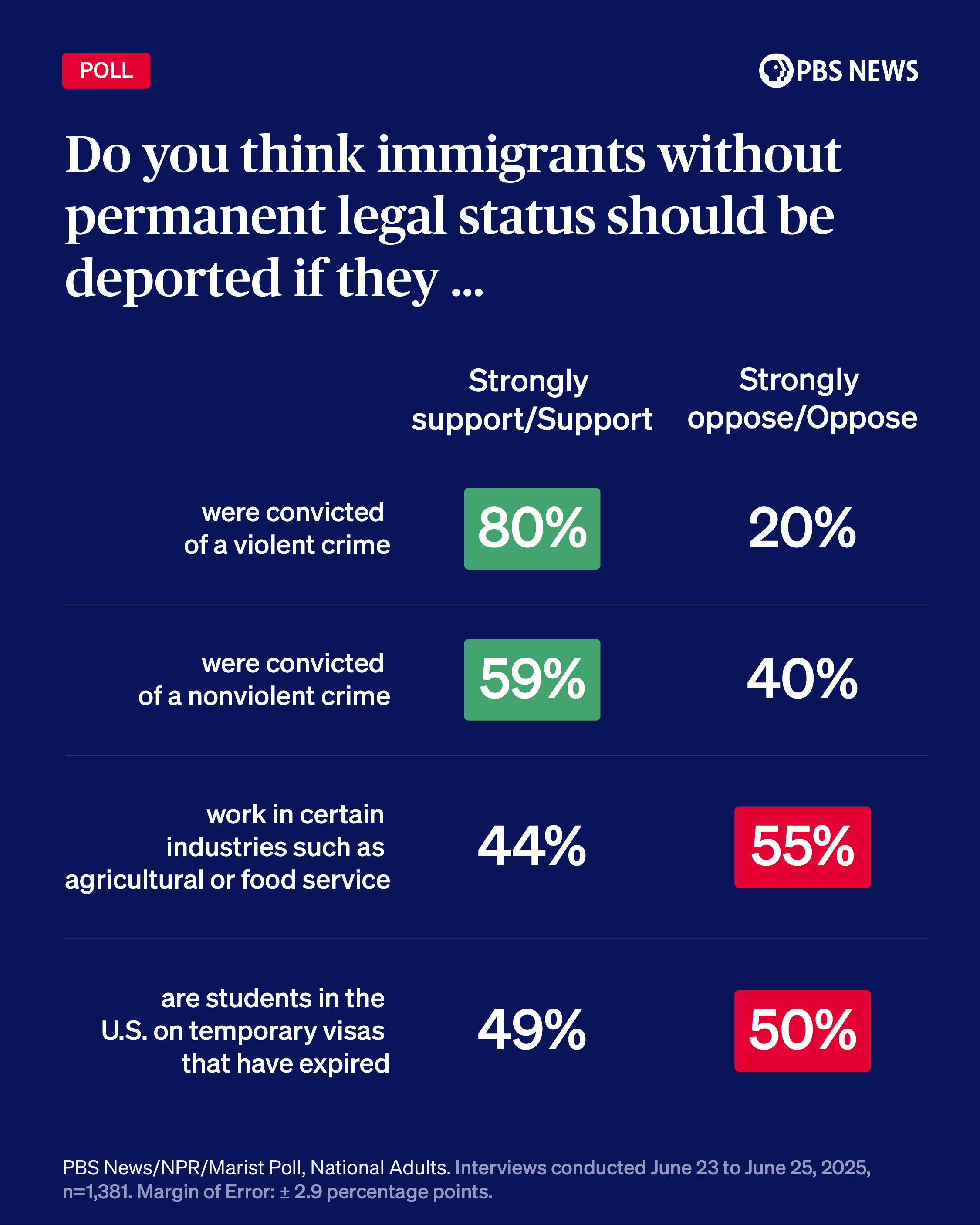
As President Donald Trump seeks to keep his campaign promise of mass deportations, a majority of Americans say actions by U.S. Immigration and Customs Enforcement have “gone too far,” according to a new PBS News/NPR/Marist poll.
More than half of U.S. adults — 54% — described ICE’s actions in enforcing the country’s immigration laws as having “gone too far.” Another 18% percent said the agency has not gone far enough, while 26% said they’d describe ICE’s actions as “about right.”
A majority of Democrats (83%) and independents (59%) said ICE has taken its actions too far. Republicans were more likely to say that the agency’s actions were appropriate, with nearly half (49%) agreeing, while another 31% said ICE “has not gone far enough.”

More than half of U.S. adults — 54% — described ICE’s actions in enforcing the country’s immigration laws as having “gone too far.,” according to the latest PBS News/NPR/Marist poll. Another 18% percent said the agency has not gone far enough, while 26% said they’d describe ICE’s actions as “about right.” Graphic by Jenna Cohen/PBS News
In this latest poll, “there weren’t many groups that said that the administration hadn’t gone far enough,” said Julia Gelatt, associate director of the U.S. Immigration Policy Program at the Migration Policy Institute. “It seems like folks are either saying ‘too far,’ or ‘stop here.’”
That’s happening at the same time that Congress is voting to “actively increase the funding for interior immigration enforcement for more ICE officers, for more detention space, and really ramp up the level of deportation,” Gelatt said.
Meanwhile, a plurality of Americans — 43% — believe the current U.S. deportation policies are making the U.S. safer. That’s compared to 33% who say they’re making the nation less safe and another 24% who say they’re not having an effect either way.
The numbers suggest that “people are getting a little more refined in terms of their views,” said Lee Miringoff, director of the Marist Institute for Public Opinion.
People think immigration policies are providing some safety to the nation, but “there seems to be a growing concern” about how certain groups are affected, Miringoff said.
Raids in and around Los Angeles in early June quickly became a national flashpoint over immigration and presidential authority. Angelenos responded to the ramped-up federal immigration enforcement by seeking to protect their families and neighbors, and protesting the raids. In response to the largely peaceful dissent — and without state leaders’ consent — Trump deployed thousands of California’s National Guard troops to the city, and sent hundreds of U.S. Marines to join them. Anti-ICE demonstrations subsequently have cropped up in other U.S. cities, in objection to Trump’s actions.
What Americans think of deportation efforts
The ICE raids have sometimes swept up people without any criminal history and those who make up a strong share of the labor workforce for different industries.
Most Americans — 80% — support or strongly support the U.S. government deporting immigrants without permanent legal status who have been convicted of a violent crime. That includes more than 90% of Republicans, 81% of independents and 75% of Democrats.
The numbers shift when Americans are asked about deporting immigrants under different circumstances:
- Immigrants without permanent legal status in the U.S. who have been convicted of a nonviolent crime: 59% support or strongly support deportations of this group, while 40% oppose deportation. The level of support was higher among Republicans (86%) and independents (57%) than Democrats (36%).
- Immigrants without permanent legal status in the U.S. who work in agricultural and food service: Overall, 55% oppose or strongly oppose deporting this group, while 44% support or strongly support deportations. These deportations saw a lower level of support among Republicans (73%), independents (40%) and Democrats (22%).
- Students who are in the U.S. on temporary visas that have expired: Americans were split on whether they were OK with deportations of this group, with 49% supporting and 50% not supporting. Support for deportation was high among Republicans (77%), while 53% of independents and 72% of Democrats said they oppose or strongly oppose forcing this group to leave.

The latest PBS News/NPR/Marist poll showed a range of opinions among U.S. adults about deporting certain groups of people. While 80 percent strongly support of support deporting immigrants without legal status if they were convicted of a violent crime, 50 percent oppose deporting students in the U.S. on temporary visas that have expired. Graphic by Jenna Cohen/PBS News
Steven Singh, a 45-year-old independent in Southern California, said when it comes to deportation policies, Trump is enforcing the law “and that’s acceptable.”
“In general, what he’s doing is right, but there’s obviously been cases where he’s been wrong and he’s overstepping his bounds,” he added.
To Singh, the current moment is “really exposing the problem that we don’t have a cohesive immigration policy and that falls on Congress.”
Singh said he’d support a “more streamlined pathway” to citizenship for immigrants and mentioned one group he didn’t want to see caught in the crosshairs.
“I hate to see the students being deported as a weapon to spread someone’s political ideals and silence others,” he said.
Joyce LeCompte, a 62-year-old Democrat in a rural part of Washington state, said it’s not necessarily the raids themselves that concern her.
“I understand that there are perhaps, at times, rationale for that,” she said. “It is really concerning the way that these raids are being conducted,” in particular with the treatment of the individuals targeted and the administration’s rhetoric surrounding these operations.
“It’s very disturbing for anyone who knows anything about history,” LeCompte said of the actions.
Eighty-one percent of Republicans believe that the U.S. deportation policies are making the U.S. more safe, far outpacing the 17% of Democrats and 34% of independents who felt the same.
Chris Spencer, a 46-year-old Republican in Ohio, believes in a pathway for citizenship for those who come to the U.S. and become members of society and who could fill the jobs in industries that need immigrant workers.
“I’m not a big fan of just bringing everyone in,” he added. “That’s ludicrous.”
Spencer also thinks that people who come to the U.S. with the intent to sell or distribute drugs or participate in criminal activities should be deported.
What Americans think about immigration and national identity
Sixty-four percent of Americans believe “openness” to people from all over the world is essential to the nation’s identity, up from 57% in October. This includes 85% of Democrats, 37% of Republicans and 68% of independents. Another 35% of Americans, including 62% of Republicans, believe the U.S. risks losing its identity if the country is too open to people outside its borders.
Poll respondents in small or big cities were likely to say that “openness” was essential, with 72% of small city residents agreeing with that sentiment, followed by 69% of those in big cities. Another 63% in suburban areas agreed.
In less-populated areas, the percentages of people who agreed with that statement were smaller. Fifty-nine percent of people in small towns and 55% in rural communities felt this way.
“We know that people who live and work around a lot of immigrants generally tend to be more supportive of immigration than people who live in places where they’re less exposed to other immigrants,” Gelatt said.
More key takeaways from the latest poll:
- Seven in 10 Americans think politically motivated violence is a major problem, while 23% say it is a minor problem and 4% say it’s not a problem at all.
- Democrats in Congress have worse approval ratings than both congressional Republicans and the president, though all three groups’ ratings are underwater. Among registered voters, 58% disapprove of the performance of Democratic lawmakers compared to 52% disapproval of Republicans and 53% of Trump.
- More than half — 53% — of U.S. adults disapprove of Trump’s handling of the economy. Eighty percent of Republicans like the job the president is doing, compared to 9% of Democrats.
- An overwhelming majority – 82% – of Americans strongly agree or agree that a president should obey federal court rulings, even if the leader does not like the ruling. Another 18% disagreed — including 30% of Republicans.
PBS News, NPR and Marist Poll conducted a survey from June 23 through June 25, 2025, that polled 1,381 U.S. adults with a margin of error of 2.9 percentage points, and 1,206 registered voters with a margin of error of 3.1 percentage points.
Support PBS News Hour
Your donation makes a difference in these uncertain times.
















































